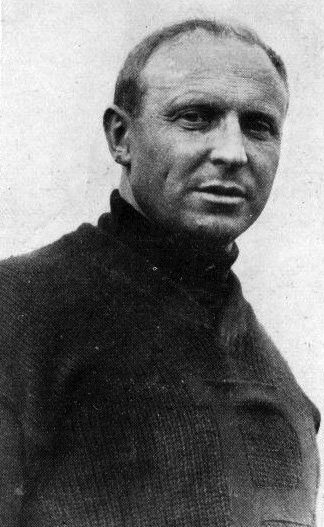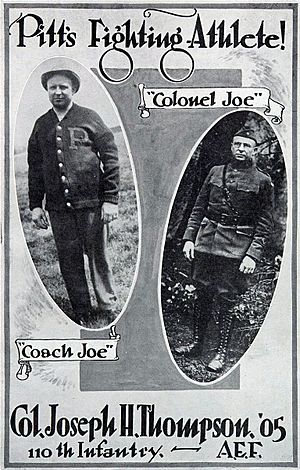Joseph H. Thompson facts for kids

1909 photo of Joe Thompson during his Pitt coaching years
|
|
| Nickname(s) | "Colonel Joe" |
|---|---|
| Born: | September 26, 1871 Kilkeel, County Down, Ireland |
| Died: | February 1, 1928 (aged 56) Beaver Falls, Pennsylvania, U.S. |
| Career information | |
| Position(s) | Halfback |
| College | Geneva College Western University (PA) |
| Career history | |
| As coach | |
| 1900–1902? | Geneva |
| 1907 | Carnegie Tech |
| 1909–1912 | Pittsburgh |
| As player | |
| 1900–1902? | Geneva |
| 1904–1906 | Western University (PA) |
| Career highlights and awards | |
|
|
|
|
| Military career | |
| Allegiance | |
| Service/ |
|
| Years of service | 1917–1919 (active duty) |
| Rank | Colonel |
| Unit | 110th Infantry, 28th Division |
| Battles/wars | World War I |
| Awards | Medal of Honor |
| Member of the Pennsylvania Senate from the 47th district |
|
| In office 1913–1916 |
|
| Personal details | |
| Political party | Republican |
| Occupation | Lawyer |
Joseph "Colonel Joe" Henry Thompson (born September 26, 1871 – died February 1, 1928) was an amazing person who achieved a lot in his life. He was a brave soldier in World War I, earning the highest military award, the Medal of Honor. He was also a lawyer, a state senator in Pennsylvania, and a very successful football coach for the University of Pittsburgh Panthers. He was even honored in the College Football Hall of Fame!
Contents
College Years and Sports
Geneva College Days
Joseph Thompson came to the United States from Ireland when he was 18 years old, in 1898. He started studying at Geneva College that same year. He quickly became a star in basketball and also enjoyed gymnastics and wrestling. He didn't start playing football until 1900. For three years, he was both a player and a coach for Geneva's football team. Under his leadership, the team had an impressive record of 27 wins, 2 losses, and 3 ties!
Playing at the University of Pittsburgh
Thompson continued his education at the University of Pittsburgh, which was then known as the Western University of Pennsylvania. He played football there from 1904 to 1906. During this time, the Pitt Panthers football team won 26 games and lost only 6. In 1904, he was the captain of the Pitt football team, leading them to their first-ever perfect season. They won all ten of their games and only allowed their opponents to score one touchdown the entire season! Thompson graduated from Pitt in 1905 and then went on to study law at the School of Law.
Professional Life and Leadership
Coaching Football
After finishing law school, Thompson became the head football coach at Pitt from 1909 to 1912. He led the team to a record of 22 wins, 11 losses, and 2 ties. The most exciting part of his coaching career was the 1910 season. That year, Pitt had a perfect record, winning all 9 games, and their opponents didn't score a single point against them! Many people considered them the national champions for that season. Pitt outscored their opponents 282 to 0.
People admired Thompson so much that a song was written to honor him as Pitt's football coach. It was called "Joe Thompson" and was sung to the tune of the famous American folk song "Old Black Joe".
Thompson also coached the track and field team at Pitt starting in 1904. He even coached football at other schools, including Pittsburgh High School, Carnegie Technical Schools (now Carnegie Mellon University), and Rochester High School.
Politics and Law Career
From 1913 to 1916, Thompson served as a state senator for the 47th District in Pennsylvania. He was a member of the Republican Party. He also worked as a lawyer in Beaver Falls, Pennsylvania, until he passed away in 1928 due to health issues that were made worse by his war injuries.
Hall of Fame Honors
Joseph Thompson's incredible achievements were recognized long after his death. In 1971, he was inducted into the National Football Foundation's College Football Hall of Fame. He was also honored by being inducted into the Beaver County Sports Hall of Fame in 1977.
Military Service in World War I
Thompson joined the Pennsylvania National Guard in 1905. He quickly moved up in rank, becoming a second lieutenant in 1906, a captain in 1909, and a major in 1912. When World War I began, he served actively from 1917 to 1919. He was promoted to lieutenant colonel in 1918 and finally to colonel in 1919.
During his service in France with the 110th Infantry Regiment, he was wounded four times in just a few days in September and October 1918. He was even gassed on one of those occasions. Despite his injuries, he bravely stayed on duty each time. By April 1919, he was commanding the 110th Infantry Regiment. He returned to the United States in May 1919, but went back to France in June to help bring his regiment home. He was officially discharged from active duty in December 1919.
For his amazing bravery on October 1, 1918, Major Thompson was first given the Distinguished Service Cross. This award was later upgraded to the Medal of Honor in 1925, which is the highest military award in the United States. Because he was wounded four times, he was allowed to wear four wound chevrons on his uniform. These were the early versions of what we now know as the Purple Heart medal.
Military Awards
Thompson received several important military awards for his service:
- Medal of Honor
- World War I Victory Medal (with five service stars for different battles)
- Ordre national de la Légion d'honneur (Legion of Honor, Knight degree) from France
- Croix de guerre 1914–1918 (War Cross) with a bronze palm from France
See also
 | Shirley Ann Jackson |
 | Garett Morgan |
 | J. Ernest Wilkins Jr. |
 | Elijah McCoy |


